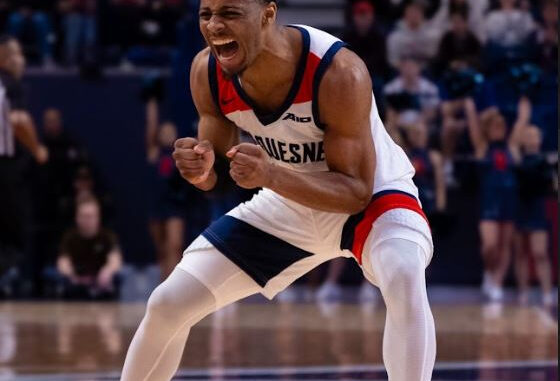
Spencer Thomas | Sports Editor
Sounds of Duquesne basketball echo off the padded walls of the practice gym. Shoes squeak on hardwood and harmonize with the whistles and bouncing balls. One voice cuts through it all. Kareem Rozier.
He bounces around jovially, directing on the court and celebrating every made shot and foul drawn like it’s the last game of the season.
If you didn’t see it with your own eyes, you wouldn’t believe he is the smallest and one of the youngest players on the team.
Teammate Tre Williams remembers the first time he met Rozier. He was one of the few returning players from an underwhelming 2021-22 Duquesne basketball team that desperately needed a culture revival.
In walked the teenage freshman, whose voice stands miles taller than his 5-foot 9-inch frame. He showed up with a loud mouth intent on piloting the program’s renaissance.
Williams knew he had a born leader from day one.
“It’s crazy. I’d never seen nothing like it before. He’s 18-years-old coming in here speaking to us like he’s a grown man,” Williams said. “And we’re minding and listening to him!”
Head Coach Keith Dambrot said that Rozier is the greatest leader he’s ever had. That’s high praise from a man with over three decades of coaching experience who almost exclusively employs many of his former players as assistants.
Any fan who has been to a game at Cooper Fieldhouse over the last two seasons immediately knows what Dambrot is talking about. Rozier is the loudest and most engaging player on the court. He’s the first to hype up the crowd, pick up a teammate or rile up the bench.
Rozier had these tendencies long before he set foot in Pittsburgh.
“It’s just how I’ve been raised. From my dad and mom since I was a youngin,” Rozier said. “To always be a leader. Make people follow you the right way.”
Both Dambrot and Rozier say they clicked immediately during the recruiting process. Rozier wanted a program that embraced his personality and gave him the freedom to take the reigns, Dambrot wanted to let him.
“That’s why we took him. A lot of people shied away because of his size,” Dambrot said. “It’s not the size of the man, it’s the other parts. The big brain, the big heart.”
He cited his close friend and former assistant, Marquette Head Coach Shaka Smart. “If you see a leader and they’re close to being a good enough player, you better take them, because there aren’t many anymore.”
Rozier waltzed into the captaincy, and his imprint on the program grows every day. Before each game, the team huddles in the tunnel, heads tilted downward toward their leader.
“WHO GOT MY BACK?” Rozier screams.
The team responds. “I GOT YOUR BACK!”
This continues, and each repetition is louder until it reaches a crescendo, and the entire arena can hear it. The team breaks the huddle and sprints onto the court. This was all Rozier’s idea.
“[Coach] has allowed me to show my gifts and lead this team since I was 17,” Rozier said. “It’s real. That’s who I am. That’s why I enjoy bringing it every day.”
After the disaster that was 2021, nearly everyone left the team. They desperately needed talent and a voice to lead it. Rozier stepped in when they were at their lowest.
“I’m the kind of kid that I want to go in and change something. All the teams that win, everybody wants to go there. Don’t nobody want to be a part of a team that’s down in the gutter,” he said. “Then you see what happened last year. We win 20 games, and now we’re on the road to winning much bigger things. Then everyone’s going to want to come here. I’m just all about changing programs into winning programs.”
Before every practice, Dambrot sits down for a meeting with Rozier, where they calculate a plan to “attack the day”.
They talk about how to get through to his teammates, their different perspectives conspiring to maximize potential.
Then, they meet after practice. Dambrot says Rozier helps build culture through accountability.
“You can’t win if you don’t have a good culture,” Dambrot said. “He just comes every day and isn’t afraid to tell the guys the truth. And then whenever we have lulls or dips, he gets on them.”
Rozier’s ability as a player is catching up too. After coming off the bench his freshman year, Rozier has started every game this season, nearly doubling his scoring average. He strives to improve as a passer that can better compliment the shooters with whom he shares the backcourt.
Being a leader isn’t all powerful and glamorous moments. It also means stepping up in the ugly ones. There’s been a lot of those lately. On a five-game losing streak, Rozier was waist-deep in the program’s lowest moment since he came. When the team wins, stars like Dae Dae Grant and Jimmy Clark III are made available to the media. After every loss, it’s Rozier, the mouthpiece for the team in its most difficult moments.
He knows his gift better than anyone and sees it as a role that he must fulfill. After last week’s heartbreaking loss to Richmond, Rozier talked about how the team’s makeup can help them get right, on and off the court.
“We’ve got a lot of older guys,” he said. “And we have me.”

